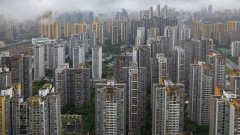
Xie Dongming, director of the Research Director of the Greater China of Overseas Chinese, judged that real estate is one of the most noteworthy economic indicators in the second half of the year. "If the Chinese economy is going to reach the expected growth goal this year, the property market will be at least flat with last year and cannot fall."
The multi -round loose policy has not reversed the downturn in China's real estate market. The recent outbreak of owners of rotten tail buildings stop loan storms even worsen the snow market.The analysis believes that whether the property market can get out of the vicious circle in the second half of the year has become an important indicator of observing China's economic direction.
The data released by the National Bureau of Statistics of China on Friday (July 15) shows that the real estate development investment in the first half of the year fell 5.4 % year -on -year, the sales area of commercial housing nationwide fell by 22.2 %, and the sales of commercial housing decreased by 28.9 %.According to Bloomberg, the price of commercial housing in 70 large and medium -sized cities fell 0.1 % in June, and fell in the 10th consecutive month.
Xie Dongming, director of the Research Director of the Greater China of Overseas Chinese Bank, was judged during an interview with Lianhe Morning Post. Real estate is one of the most noteworthy economic indicators in the second half of the year.Can't fall. "
Xie Dongming said that after the Chinese property market has experienced multiple rounds of policies, it has not yet stepped out of the vicious circle of housing sales and the interactive impact of real estate investment. This rare phenomenon highlights the weakness of residential departments exceeding expectations.The epidemic impacts the economy and employment outlook, which has led to a high willingness to savings and weak consumption willingness.House sales have decreased, real estate investment has declined, and it has dragged downstream industries, which seriously impacts the overall economy.
He added that recently, China's rotten building has suspended loan, which has caused market concern whether the property market will upgrade from liquidity crisis to systemic risks."Whether real estate can stop falling in the second half of the year is critical to the overall economy."
Due to concerns about the extension of the project construction and the decline in housing prices, at least 100 real estate owners in more than 50 cities have recently suspended home loans collectively.According to statistics from the suspension of loan disclosure disclosed by a number of banks, the balance of mortgage loans related to loan -loan real estate reached 2.11 billion yuan (RMB, the same, the same, new 440 million yuan).
The suspension of loan storms will not constitute a systemic crisis to the overall banking industry
The China Banking and Insurance Regulatory Commission stopped loan storms on Thursday (14th), referring to guiding the marketization of financial institutions to participate in risk disposal, and strengthening the work of work with the housing and construction departments and the Chinese Central Bank.However, the four major banks said in a response that the balance of loan loans involved in the suspension of loans accounted for a small proportion of the entire mortgage loan balance, and the overall risk was controllable.Chen Bo, the dean of the Wuhan Optics Valley Institute of Free Trade, believes that this round of suspension of loan storms is expected to not exceed 10 billion yuan. It is unlikely that the overall banking industry is unlikely to constitute a systemic crisis, let alone affect the overall economy.The U.S. subprime crisis was not the same volume in 2008.
Chen Bo pointed out that the real estate industry accounts for about a quarter of China's GDP (GDP). It is an important engine to drive economic growth. The weak property market will make the overall economic growth more weak.However, the rents and housing prices in first -tier cities such as Shanghai are still rising steadily, indicating that market demand has not disappeared, but it has been distorted by relevant purchase restriction regulations. Next, there is still room for adjustment through policies.




